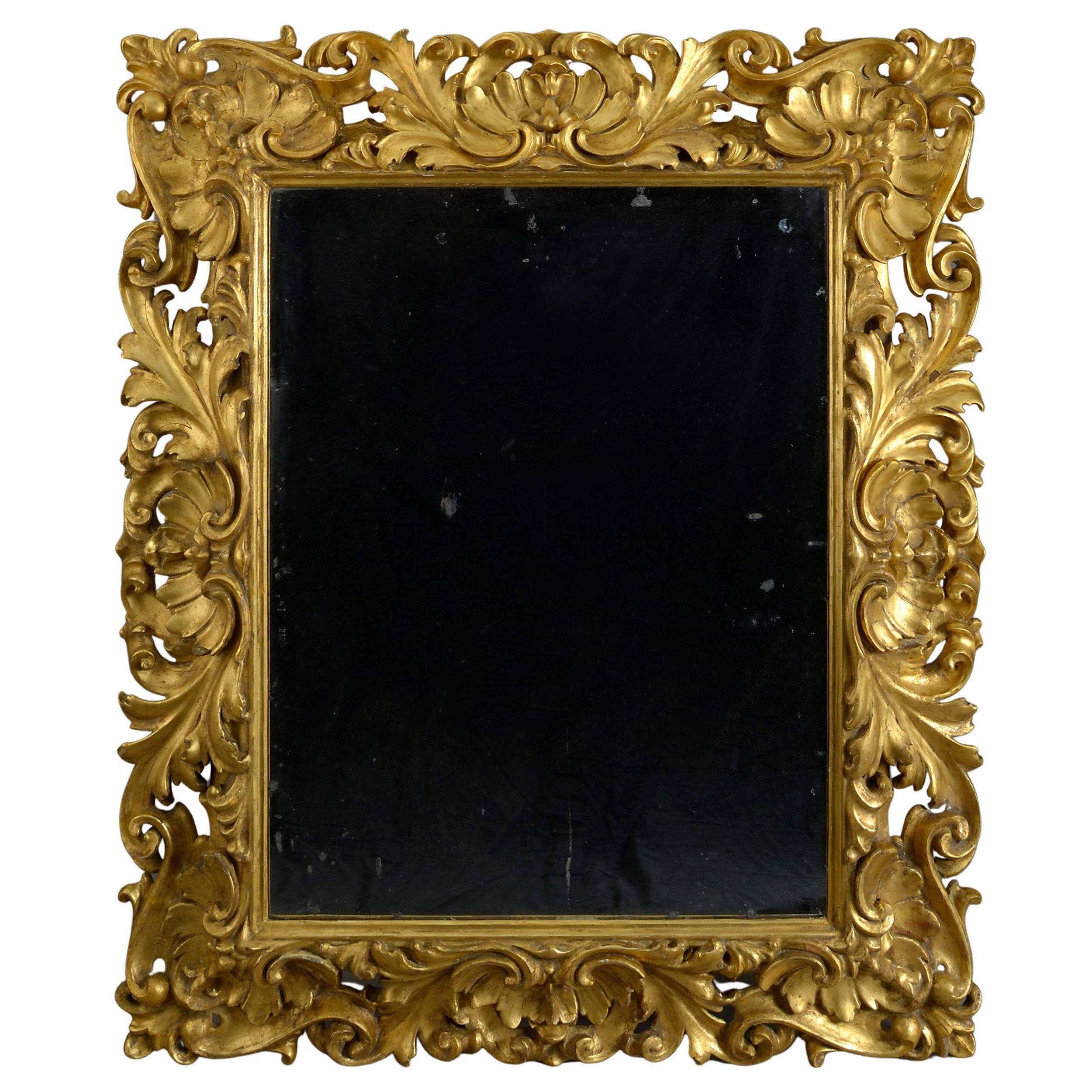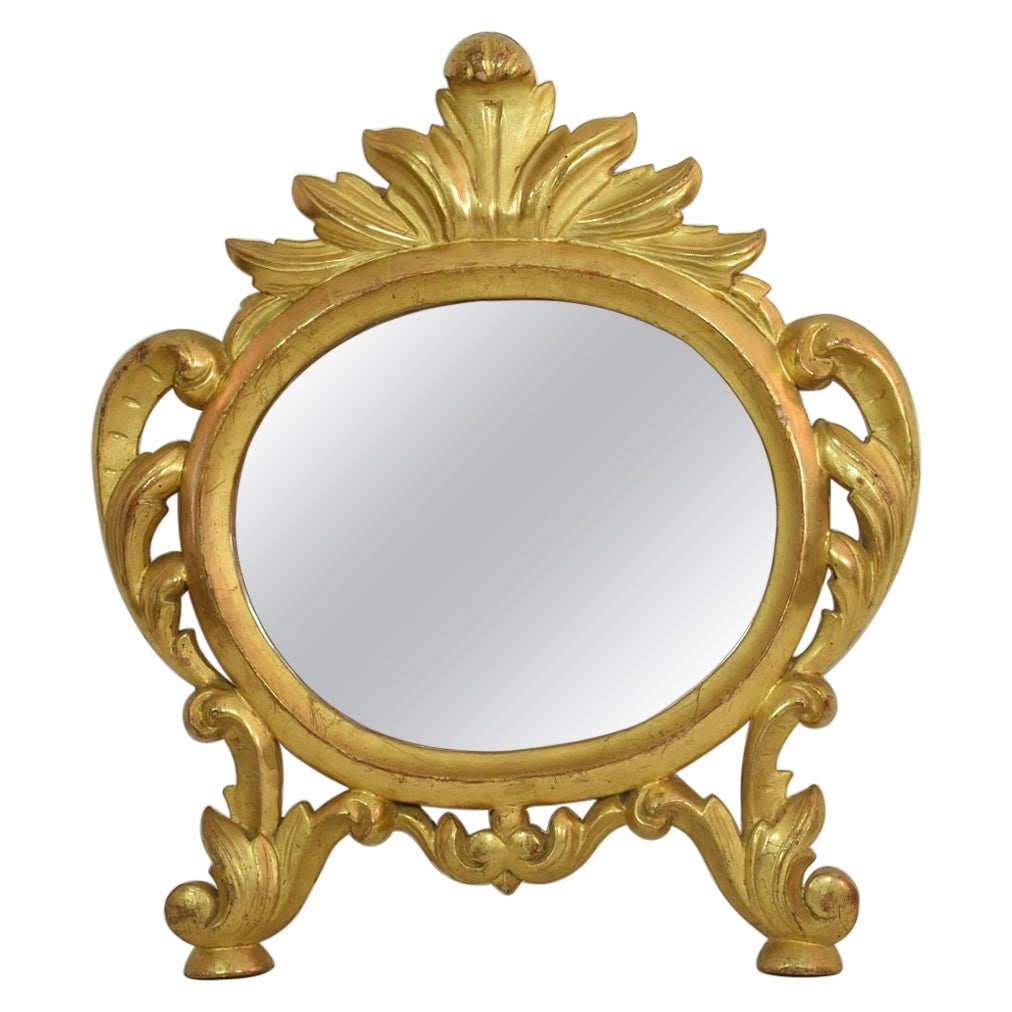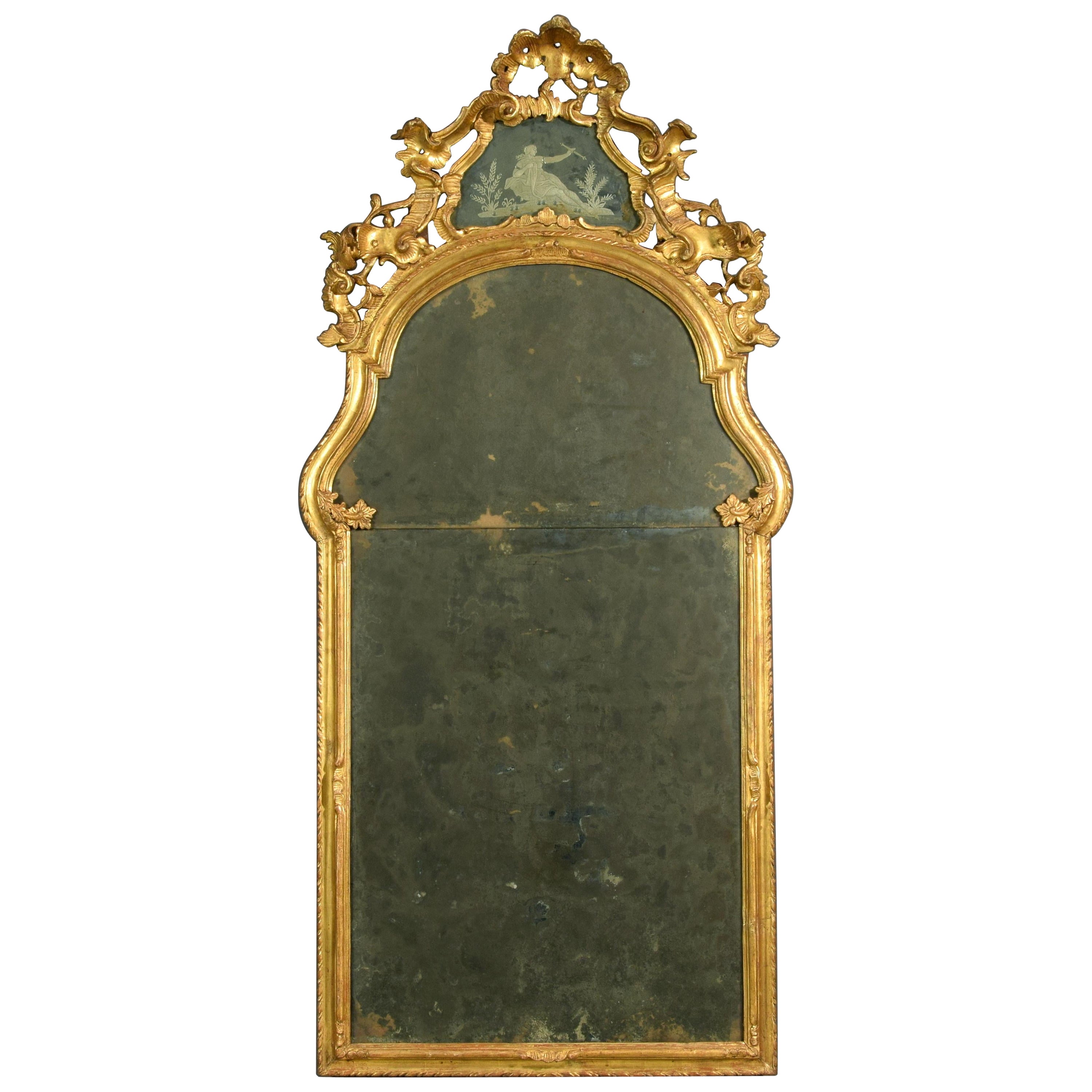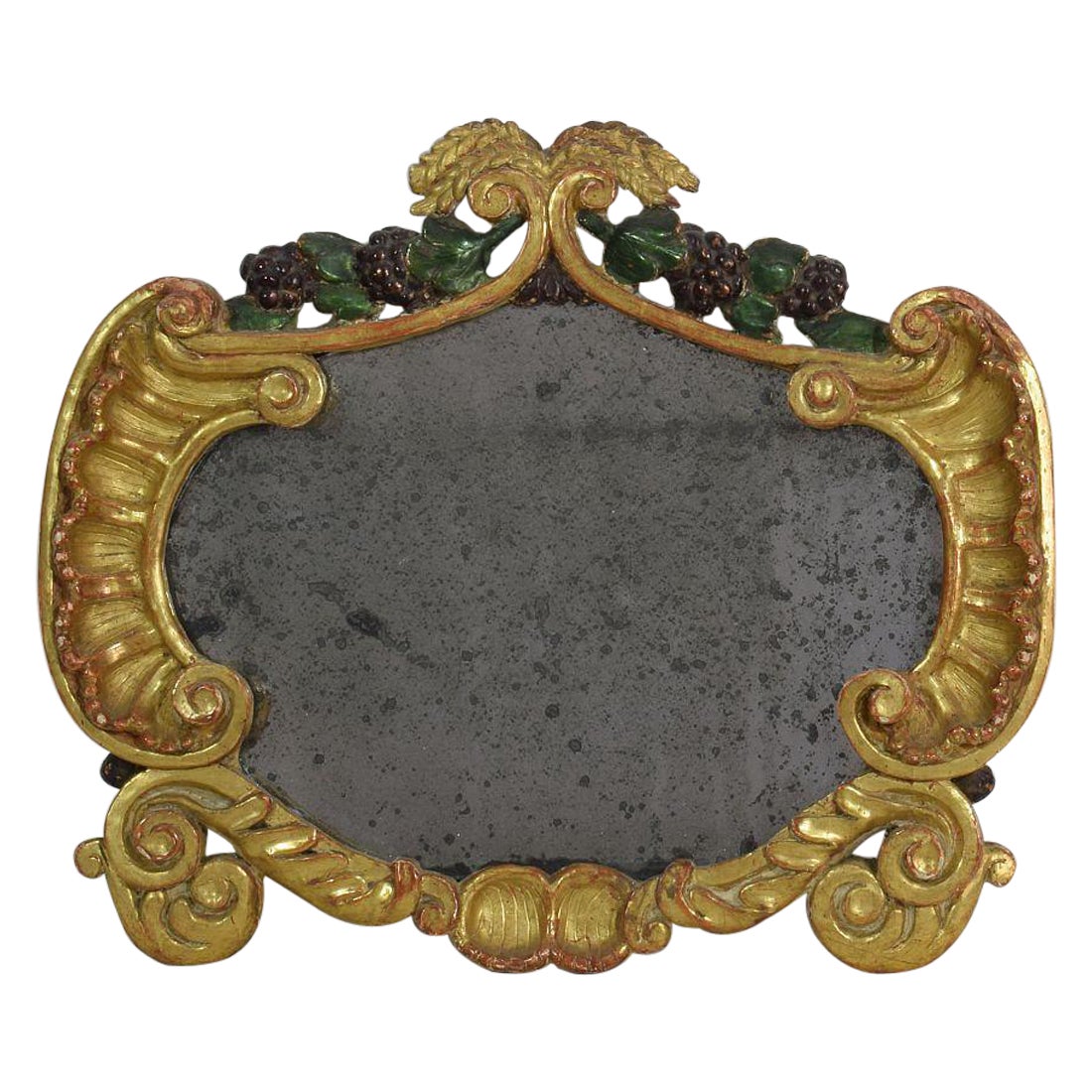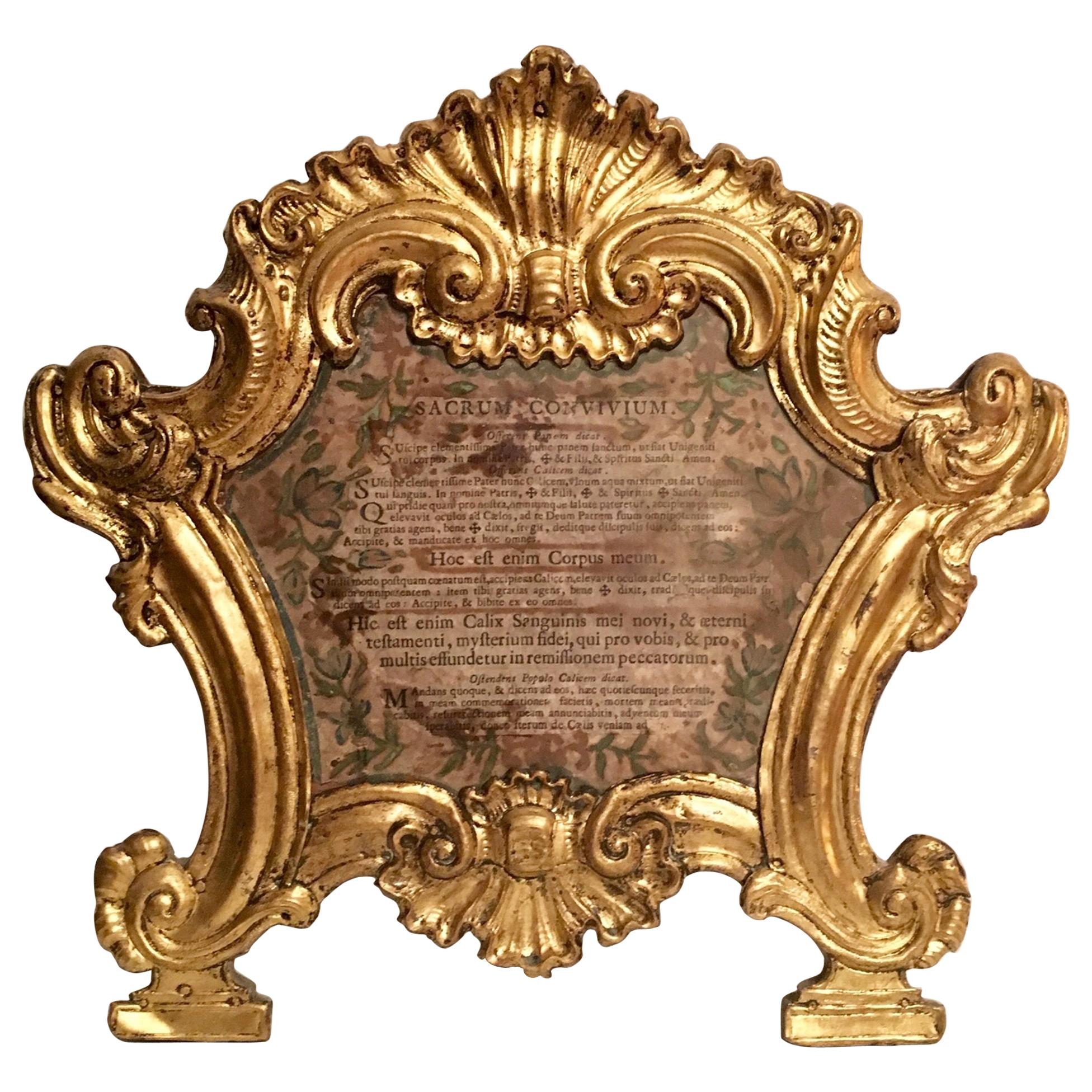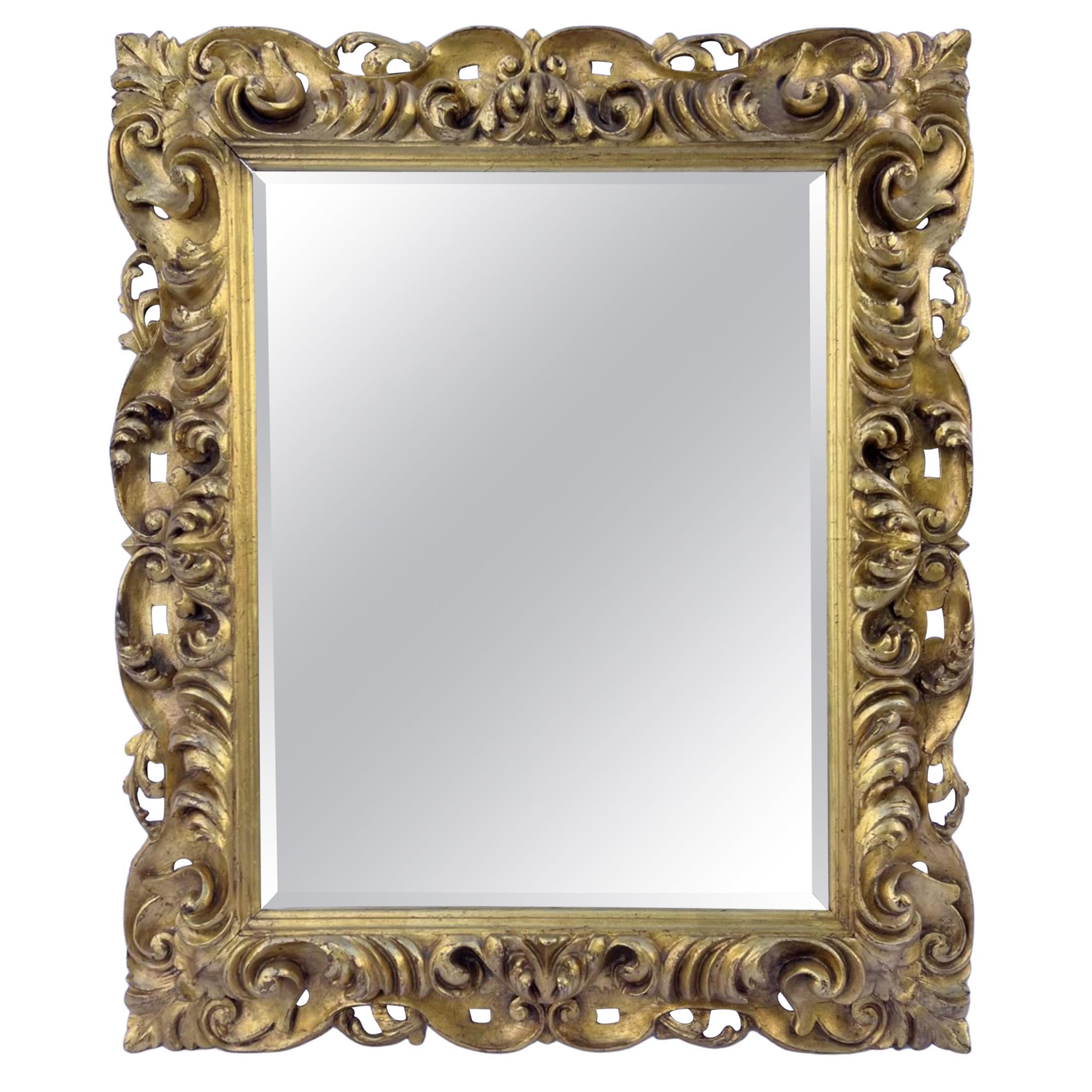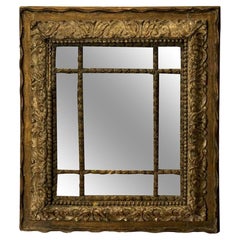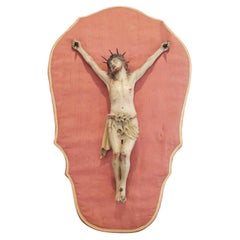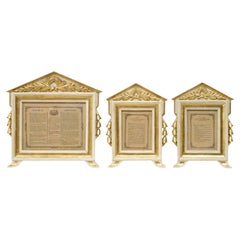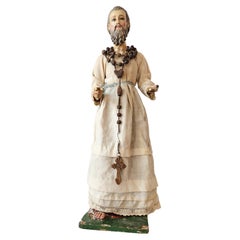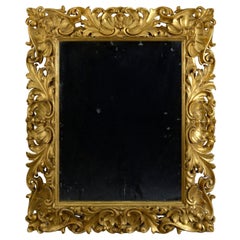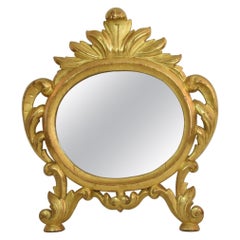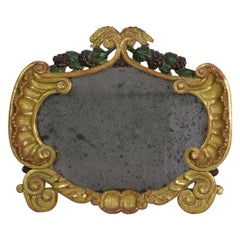Items Similar to 18th Century Italian Baroque Period Carta Gloria Altar Card Giltwood Mirror
Want more images or videos?
Request additional images or videos from the seller
1 of 18
18th Century Italian Baroque Period Carta Gloria Altar Card Giltwood Mirror
About the Item
A most impressive, large scale, museum exhibition quality Baroque period Italian Catholic church cartaglorie altar card frame, now repurposed and fashioned as a stunning mirror.
Born in Italy in the 18th century, possibly Venetian, the exceptionally executed ecclesiastical antique, circa 1730, features a curved, cartouche shaped sculptural wooden frame, richly gilded, and surrounded by ornate, finely detailed hand carved and sculpted Rocaille elements of leafy acanthus volute spiral scroll motif, having a floral crest over center medallion adorned with Marian monogram religious symbol, decorative beaded trim ornamentation that once framed the main altar card now encasing a later flat mirror plate.
A truly magnificent example of the European Baroque Art movement, the rare religious folk art work presents superbly, with intricate carving, movement, exuberant detail, brilliant water gilding grandeur, and surprise to achieve a sense of awe!
Provenance:
From a prominent Dallas, Texas estate
Dimensions:(approx)
26.5" High, 35" Wide, 2" Deep;
10lbs
Altar cards explain the part of the Mass being performed, containing certain prayers that the priest must say during the Mass, and their only purpose is as a memory aid, although they are usually very beautifully decorated.
Not used prior to the 16th century, Pope Pius V restored the Missal, only the card at the middle of the altar was used, and it was called the "Tabella Secretarum".
The use of altar cards had strict rules, including it may only stand on the altar during Mass. The center one (the one offered here) stands against the Tabernacle, or altar cross, and after Mass, must either be removed or placed face downwards under the altar cover. The cards must be removed for the Exposition of the Blessed Sacrament.
- Dimensions:Height: 26.5 in (67.31 cm)Width: 35 in (88.9 cm)Depth: 2 in (5.08 cm)
- Style:Baroque (Of the Period)
- Materials and Techniques:
- Place of Origin:
- Period:
- Date of Manufacture:circa 1730
- Condition:Wear consistent with age and use.
- Seller Location:Forney, TX
- Reference Number:1stDibs: LU5977226124092
About the Seller
4.8
Platinum Seller
Premium sellers with a 4.7+ rating and 24-hour response times
Established in 2013
1stDibs seller since 2021
287 sales on 1stDibs
Typical response time: 1 hour
- ShippingRetrieving quote...Shipping from: Forney, TX
- Return Policy
Authenticity Guarantee
In the unlikely event there’s an issue with an item’s authenticity, contact us within 1 year for a full refund. DetailsMoney-Back Guarantee
If your item is not as described, is damaged in transit, or does not arrive, contact us within 7 days for a full refund. Details24-Hour Cancellation
You have a 24-hour grace period in which to reconsider your purchase, with no questions asked.Vetted Professional Sellers
Our world-class sellers must adhere to strict standards for service and quality, maintaining the integrity of our listings.Price-Match Guarantee
If you find that a seller listed the same item for a lower price elsewhere, we’ll match it.Trusted Global Delivery
Our best-in-class carrier network provides specialized shipping options worldwide, including custom delivery.More From This Seller
View All18th Century Italian Baroque Period Giltwood Mirror
Located in Forney, TX
This exceptionally carved Baroque period Italian mirrored mercury glass giltwood wall hanging / mantel mirror captures the reason why we love Eur...
Category
Antique 18th Century Italian Baroque Wall Mirrors
Materials
Glass, Giltwood, Mirror
18th Century Spanish Baroque Period Christ Crucified Altar Sculpture
By Juan De Mesa
Located in Forney, TX
A scarce Baroque Period Spanish altarpiece retablo / reredo, by (attributed) Luis Salvador Carmona (1708-1767), depicting thorn crowned Christ crucified / Cristo crucificado hand carved, polychromed wood with forged iron nails, mounted on later plaque.
This rare antique religious work / object of art, circa 1750, most likely commissioned by the Catholic Church of Spain, destined to be prominently displayed as an altarpiece / retablo or as part of a much larger reredo, directly behind the main altar at a Spanish or Continental European Catholic Church (French, Italian, Iberian, Portuguese)
The Crucified Christ, displayed mounted on a later faded red fabric upholstered shaped backboard plaque with textured gilt border. The exceptional hand sculpted, carved, gessoed, polychrome painted figure depicting bloodied Jesus, with crown of thorns atop his head, only wearing a undulating shaped cloth around his loin, arms extended and feet crossed, spear head form iron nails through both. The verso covered in an old paper printed backing with metal hook hardware at top for wall hanging.
Dimensions (approx):
Overall:
22" High, 14.5" Wide, 3.25" Deep
Figure only:
16" High, 10" Wide, 3" Deep
Historical background:
Artist: (attrib)
Luis Salvador Carmona (1708, Nava del Rey – 1767, Madrid) was a Spanish Baroque sculptor who came from a family of artists, including uncle of Manuel Salvador Carmona. He was sent to be trained in Madrid in the workshop of Juan Alonso...
Category
Antique 18th Century Spanish Baroque Religious Items
Materials
Iron
Rare Antique Religious Italian Catholic Church Carta Gloria Altar Card Frame Set
Located in Forney, TX
A rare complete set of three antique Italian Grand Tour ecclesiastical hand carved parcel gilt cream painted pine "Carta Gloria" altar card frames.
Italy...
Category
Antique 19th Century Italian Neoclassical Religious Items
Materials
Pine, Giltwood
17th/18th Century Baroque Period Carved Polychrome Santo Altar Statue
Located in Forney, TX
A scarce Baroque period Spanish or Italian hand carved polychrome painted wood Santo sculpture with inset colored glass eyes, original white robe garb and later wood rosary.
Intrica...
Category
Antique Early 18th Century European Baroque Religious Items
Materials
Gesso, Wood, Paint
18th/19th Century Italian Baroque Silvered Metal Altar Monstrance Reliquary
Located in Forney, TX
A stunning antique Italian Baroque style silvered metal gilded wood monstrance reliquary. circa 1770-1820
Handmade in Italy in the late 18th / early 19th century, commissioned by the church to display an important religious relic, sculptural painted wood form, mounted with decorative silver repousse metal facing, open oval window where the philatory relic was once housed, rising on a gold gilt painted shaped plinth base.
Dimensions: (approx)
17" High, 8" Wide, 5" Deep, 1.25lbs
History:
Reliquaries (also referred to as a shrine or châsse in French), are containers used to protect and display relics. A portable reliquary may be called a fereter, and a chapel in which it is housed a feretory. A monstrance, also known as an ostensorium (or an ostensory), is a vessel used in Roman Catholic, Old Catholic, High Church Lutheran and Anglican churches for the display on an altar of some object of piety, such as the consecrated Eucharistic host during Eucharistic adoration or Benediction of the Blessed Sacrament. It is also used as reliquary for the public display of relics of some saints.
The use of reliquaries became an important part of Christian practices from at least the 4th century, initially in the Eastern Churches, which adopted the practice of moving and dividing the bodies of saints much earlier than the West, probably in part because the new capital of Constantinople, unlike Rome, lacked buried saints. Relics are venerated in the Oriental Orthodox, Eastern Orthodox, Roman Catholic and some Anglican Churches. Reliquaries provide a means of protecting and displaying relics. While frequently taking the form of caskets, they range in size from simple pendants or rings to very elaborate ossuaries.
The relics were enshrined in containers crafted of or covered with gold, silver, gems, and enamel. These objects constituted a important form of artistic production across Europe and Byzantium throughout the Middle Ages.
Many were designed with portability in mind, often being exhibited in public or carried in procession on the saint's feast day or on other holy days. Pilgrimages often centered on the veneration of relics. The faithful often venerate relics by bowing before the reliquary or kissing it; those churches which observe the veneration of relics distinguish between the honor given to the saints and the worship that is due to God alone.
Sixteenth-century reformers such as Martin Luther opposed the use of relics since many had no proof of historical authenticity and objected to a cult of saints. Many reliquaries, particularly in northern Europe, were destroyed by Calvinists or Calvinist sympathizers during the Reformation...
Category
Antique Early 19th Century Italian Baroque Sculptures and Carvings
Materials
Metal
Mid-Century Italian Lupi Cristal-Luxor Vanity Set
By Lupi Cristal Luxor
Located in Forney, TX
A stunning Italian Modernist blue glass bathroom vanity set by LUPI Cristal-Luxor. The fabulous Art Deco and Hollywood Regency influenced vintage s...
Category
Mid-20th Century Italian Hollywood Regency Wall Mirrors
Materials
Chrome
You May Also Like
18th Century, Baroque Period Carved Giltwood Mirror
Located in London, GB
A large early eighteenth century Baroque mirror, the profusely carved foliate giltwood frame housing a period mercury glass plate
Circa 170...
Category
Antique Early 18th Century Italian Baroque Wall Mirrors
Materials
Giltwood
18th Century, Italian Carved Giltwood Baroque Mirror
Located in Buisson, FR
Beautiful carved giltwood baroque mirror, Italy, circa 1750. Weathered, small losses and old repairs.
Category
Antique 18th Century Italian Baroque Wall Mirrors
Materials
Wood
$1,037 Sale Price
54% Off
18th Century, Italian Baroque Carved and Giltwood Mirror
Located in IT
18th century, Italian baroque carved and giltwood mirror
This refined mirror was made in Venice, Italy, in the eighteenth century and has the characteristic decoration of the Ven...
Category
Antique Mid-18th Century Italian Baroque Wall Mirrors
Materials
Mirror, Wood, Giltwood
$17,152 Sale Price / set
20% Off
Small 18th Century, Italian Carved Giltwood Baroque Mirror
Located in Buisson, FR
Beautiful carved giltwood Baroque mirror, with its original foxed mirror glass.
Italy, circa 1750. Weathered and minor losses.
Category
Antique 18th Century Italian Baroque Wall Mirrors
Materials
Giltwood
$921 Sale Price
42% Off
18th Century Carta Gloria
Located in Vero Beach, FL
This original 18th century frame is gilded over copper. It is elaborately embossed and chiseled. The cartouche is surrounded by rocaille and volute motifs. The Carta is mounted on a wood backing and rests on two linear bases. It is very rare to find the original altar glory prayer still present inside. It explains the part of the Mass being performed.
This is an extremely special museum piece for any ecclesiastical collection.
Measurements: W 14 ½” x H 14” x D 1”
Weight: 1 lb 8 oz
Category
Antique 18th Century Italian Baroque Religious Items
Materials
Copper
18th Century Baroque Florentine Hand Carved Giltwood Mirror.
Located in Vero Beach, FL
Late 18th Century Baroque Florentine Hand Carved Giltwood mirror
Large late 18th century spectacular Baroque period mirror, profusely hand carved...
Category
Antique Late 18th Century Italian Baroque Wall Mirrors
Materials
Giltwood
$2,600 Sale Price
20% Off
Recently Viewed
View AllMore Ways To Browse
Wall Art Medallions
Decorative Cross For Wall
Floral Medallion Mirror
16th Century Cross
Wall Altar
Monogram Mirror
Antique Tabernacle
Altar Frame
Religious Medallion
Prayer Beads
Prayer Stand
Catholic Priest
Catholic Cross
Antique Catholic Crosses
Antique Prayer Stand
Ecclesiastical Stands
Antique Religious Medallions
Carved Tabernacle
